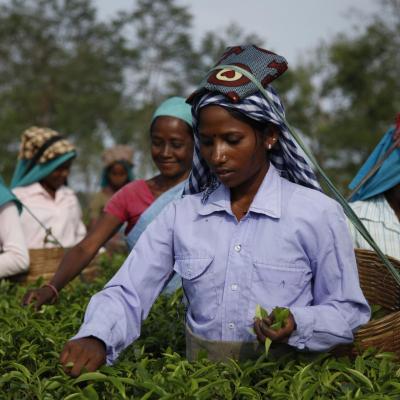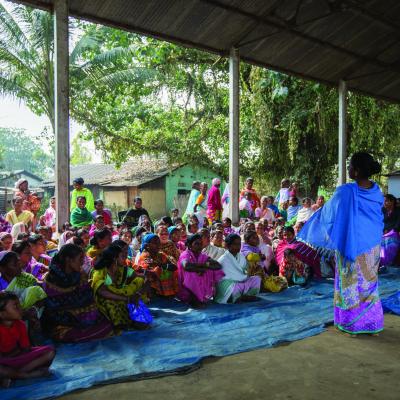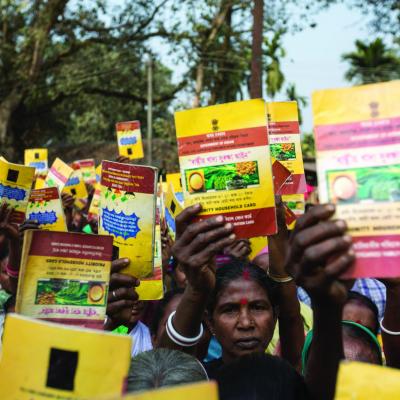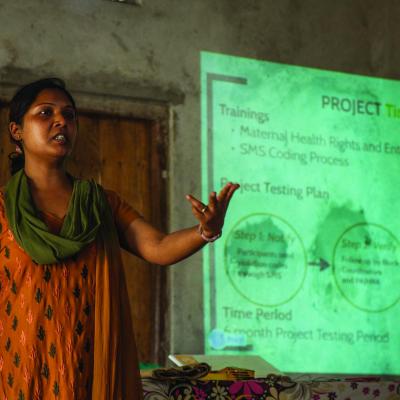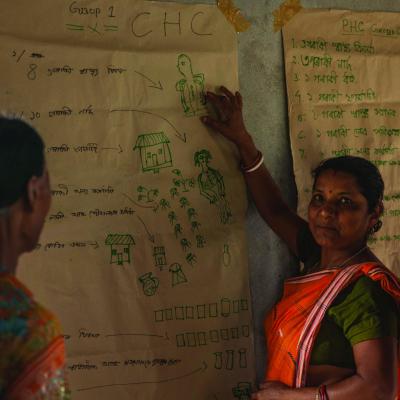The State of Assam experiences the highest maternal mortality rate in India. Health concerns are compounded on tea plantations where workers face substandard working conditions and a lack of access to essential services that negatively impact their health. This project developed grievance forums to identify and monitor rights violations, provide a mechanism for communities and the legal/administrative systems to discuss issues and concerns, and ultimately assist women in seeking redressal for their maternal and child health problems.
Challenge
For about 2 centuries, indigenous workers in Assam's tea plantations, have lived in a state of abject poverty, isolation, and deprivation due to inadequate access to services and facilities guaranteed to them by law. Their interaction with the outside world is heavily restricted and monitored by tea management. If they protest or agitate, they face heavy retaliation. Workers receive a wage below the legal minimum wage, and lack access to the most basic facilities like adequate housing, water, toilets, creches, food grains, safety gears, medical care and so on. High levels of malnutrition and anemia in women, and low levels of literacy are rampant. At the core of all the problems faced by women in tea plantations is that they get an illegally low wage of about 2 dollars a day. In other words, workers struggle with everyday needs and survival. This is a context where a disempowered, disenfranchised community of impoverished workers is up against an exploitative, muscle-flexing industry. The community of workers is heavily dependent on the government for basic services, but their isolation is so acute that they do not know about their basic rights and entitlements, or how to access them. In this context, it became essential to innovate and think of a project that closes the large gap between a marginalized community and the systems of justice and governance meant to protect their rights.
Program Summary
The project aims to bridge the gap between marginalized communities and the government machinery. With a strategic approach of building legal capacity, the project empowers women from tea plantations in the state of Assam, India, to demand accountability from their government and enforce legal compliance within their work space. The first step in setting up the forum was to engage with women through community meetings and legal empowerment trainings. Through these, women workers learned to identify rights violations, record them systematically, analyze patterns of violations that emerged and then present this analysis to government officials in the grievance forums. The process created an important shift in the community's identity from "beneficiaries" of government charity to "rights holders." It was the empowering recognition that it is their Constitutional right to engage directly with their government that led to the community owning and driving the process themselves. The project has been implemented in partnership with local organizations like Promotion & Advancement of Justice Harmony and Rights of Adivasi (PAJHRA) and indigenous women's collectives like All Adivasi Womens' Association of Assam (AAWAA).
Impact
The rights-based work in developing grievance forums for community monitoring have resulted in positive impact by informing communities about various rights and entitlements, especially on maternal and child health. The interface provided by the project between the communities and government officials has allowed development of knowledge repositories as a means of seeking accountability. It has allowed for strategic advocacy work and has helped communities engage deeper with the government system at different levels, making the legal and administrative process less intimidating, by empowering communities to seek accountability on maternal health concerns at points of contention, among other things. Policy level implementation concerns have been identified, which has brought about awareness and developed a consciousness at the government level for grassroots implementation of various schemes and entitlements. Take for example, Cecilia, an indigenous female activist who was trained and has worked with Nazdeek for over 3 years. In one of the trainings, she learned about the subsidized food that her community is entitled to receive from the government. She passed on this information to the larger community through meetings, where everyone realized that the subsidies were not being received due to corruption and red tape at higher levels of the government. She then approached the relevant local authority and demanded that they attend a grievance forum in the community. The forum was attended by over 100 women, mobilized by Cecelia, who were able to use rights-based language to place their complaints and get their subsidized food entitlement. Women like Cecilia pose an important challenge to the patriarchal status quo, and with each win, the community and the local government recognize such trained paralegals as leaders to be reckoned with.
Anticipated Issues
There is a two-fold next step for this project. First is the ability to replicate this model in other tea plantations across Assam with support of local partners. This process has already been rolled out, and the model is being expanded to districts outside of the pilot district. Second is to amplify the work by developing solidarity across the South Asian subcontinent on improving the working conditions of tea plantation workers, especially on the issues of maternal and child health. To this end, the first step is to hold a regional roundtable for tea plantation workers and activists, where they can learn from the experiences of each other and work toward a regional movement for better living and working conditions. The aim for this is to reach tea plantation communities by harnessing cross-border learning.


